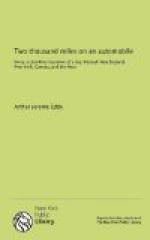On the other hand, in Michigan, a well meaning old lady sent us straight against the very worst of sand hills, not a weed, stone, or hard spot on it, so like quicksand that the wheels sank as they revolved; it was the only hill from which we retreated, to find that farmers avoided that particular road on account of that notorious hill, to find also a good, well-travelled road one mile farther around. These instances are mentioned here to show how hazardous it is to accept blindly directions given.
“Is this the road to—?” is the chauffeur’s ever recurring shout to people as he whizzes by. Four times out of five he gets a blank stare or an idiotic smile. Now and then he receives a quick “Yes” or “No.”
If time permits to stop and discuss the matter at length, do so with a man; if passing quickly, ask a woman.
A woman will reply before a man comprehends what is asked; the feminine mind is so much more alert than the masculine; then, too, a woman would rather know what a man is saying than watch a machine, while a man would rather see the machine than listen;—in many ways the automobile differentiates the sexes.
Of a group of school children, the girls will answer more quickly and accurately than the boys. What they know, they seem to know positively. A boy’s wits go wool gathering; he is watching the wheels go round.
At Carlyle, on the way to South Bend, the tire was leaking slightly, the nail had worked out. The road is a fine wide macadam, somewhat rolling as South Bend is approached.
By the road taken South Bend is about one hundred miles from Chicago,—the distance actually covered was some six or eight miles farther, on account of wanderings from the straight and narrow path. The hour was exactly two fifty-three, nearly eight hours out, an average of about twelve and one-half miles an hour, including all stops, and stops count in automobiling; they pull the average down by jumps.
The extra tire was to be at Elkhart, farther on, and the problem was to make the old one hold until that point would be reached. Just as we were about to insert a plug to take the place of the nail, a bicycle repairer suggested rubber bands. A dozen small bands were passed through the little fork made by the broken eye of a large darning-needle, stretched tight over a wooden handle into which the needle had been inserted; some tire cement was injected into the puncture, and the needle carrying the stretched bands deftly thrust clear through; on withdrawing the needle the bands remained, plugging the hole so effectually that it showed no leak until some weeks later, when near Boston, the air began to work slowly through the fabric.
Heavy and clumsy as are the large single-tube tires, it is quite practicable to carry an extra one, though we did not. One is pretty sure to have punctures,—though two in twenty-six hundred miles are not many.
Nearly an hour was spent at South Bend; the river road, following the trolley line, was taken to Elkhart.




